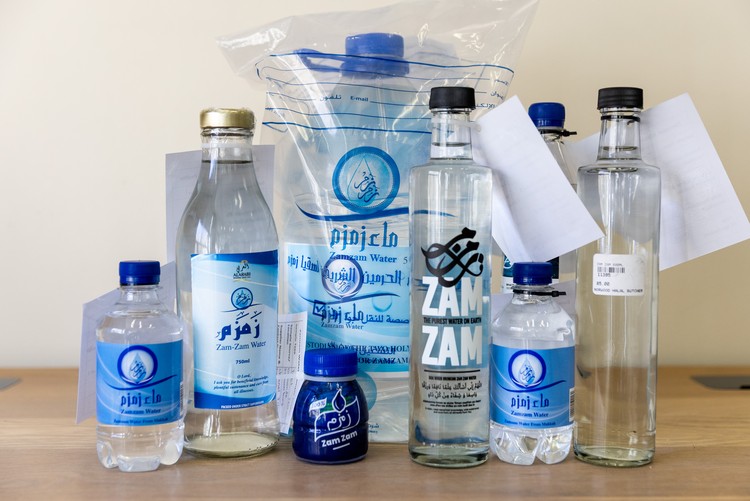
20 June 2025
A joint investigation by GroundUp and Muslim Views has revealed that bottled water, marketed as Zamzam in Cape Town, does not match the chemical profile of Zamzam water sourced from Saudi Arabia. Photos: Ashraf Hendricks
A joint investigation by GroundUp and Muslim Views has revealed that some bottled water, marketed as Zamzam in Cape Town, does not match the chemical profile of Zamzam water sourced from Saudi Arabia.
Zamzam water originates from a well in Mecca. The water produced by the well is revered by the Muslim community. The Saudi Ministry of Media explicitly states that Zamzam water “export is prohibited”. But after completing either Hajj or Umrah, pilgrims to Mecca from around the world are permitted to take one five-litre bottle with them out the country.
Nevertheless, water labelled as Zamzam is sold in South Africa - at high prices. For example, a standard 500ml bottle of water, from a well-known brand, is available from Checkers for R10. By comparison a 500ml bottle of Zamzam typically costs R50 to R55.
We purchased bottles labelled as Zamzam from retailers in Cape Town, Durban and Johannesburg. We also obtained confirmed authentic bottles of Zamzam from Saudi Arabia to serve as a control. We tested them to see if they were likely from the same source.
We asked a reputable local laboratory, accredited by the South African National Accreditation System, to test five Zamzam bottles obtained from Saudi Arabia, and compare them to 19 bottles purchased at various stores across the country. If the analysis by the lab showed the water purchased in South Africa was similar to the Zamzam from Mecca, then we would assume it was from the same source.
The samples were tested for the amount of calcium, chloride, fluoride, magnesium, potassium, sulphates and sodium they contained.
The results indicated that the water sold as Zamzam in Cape Town differed significantly from the control samples obtained from Saudi Arabia. The Durban and Johannesburg bottles were not especially different from the Saudi Arabian bottles and plausibly could be from the same source.
We consulted several experts, both locally and abroad, to verify our findings. Ismail Mahomed, a geo-hydrologist in Gauteng, said, “The [Cape Town] samples are distinctly different from the confirmed Zamzam and other samples. The [Cape Town] samples have significantly higher sodium, chloride and lower potassium and fluoride levels.”
Harris Steinman, the director of Food & Allergy Consulting & Testing Services (FACTS) said, “In this investigation, the mineral content of one group of water samples [Cape Town] were vastly different from the control group. Since these minerals cannot change over time or storage method, there can be no doubt that this group of waters are not from the same source.”
Results from both Durban and Johannesburg produced results similar to our control samples. They did not appear to be substantially different enough in chemical analysis for us to dispute that they are from the source of authentic Zamzam water.
Currently, the true source for the Cape Town bottles is unknown to us.
The labelling of all the locally bought Zamzam water bottles was not compliant with local labelling and bottling regulations.
This was confirmed by FACTS. Breaches included incorrectly naming the water, failure to state the sanitation method, no inclusion of its chemical composition, no physical address attached, and a poor description of the product.
Barcodes on bottles were non-functional.
Steinman said the lack of policing and enforcement results in some products slipping through the cracks.
“Unfortunately, one cannot take any product claims at face value. It’s essential to consistently apply critical thinking when evaluating products,” said Steinman.
“Although South Africa has fairly decent regulations governing foodstuffs, the lack of effective policing and enforcement means that consumers must read labels carefully and push back when something seems problematic.”
We identified Khalid Helal, owner of Amiiraa in Gatesville, as the supplier of the bottles of Zamzam water we bought in Cape Town.
We met Helal, who acknowledged that the export of Zamzam is illegal.
Helal is unwilling to divulge who his supplier is.
He claimed Saudi Arabia has different sanitation and bottling plants which may produce different laboratory results.
According to Helal, the purer the water is, the higher the costs. He claimed that he sells the purest Zamzam in South Africa.
Helal sent us lab results of the water he sells done at a Cape Town laboratory. But the results are devoid of context and there were no controls. The lab results also differed from the results of the Zamzam water obtained from Saudi Arabia in the lab we used.
Stores that Amiiraa has supplied have since removed the water from their shelves.
Zamzam bottled water is sold at a premium.